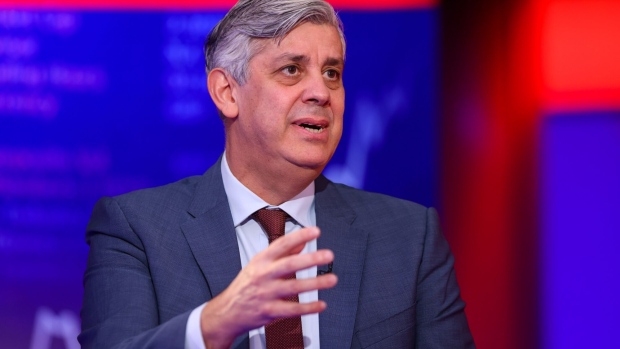Apr 17, 2024
ECB Won’t Be Guided by US Economy in Setting Rates, Centeno Says
, Bloomberg News

(Bloomberg) -- The European Central Bank will set monetary policy based on the situation on its home turf rather than take its cue from the US, according to Governing Council member Mario Centeno.
“If the ECB, looking at inflation and the economic conditions of the euro area, has to decide to cut, that’s its job,” the Portuguese official said in an interview. “It’s not looking at the US to see what the US does. If the Fed does something different, it’s because the Fed is facing a different economy.”
Speaking in Washington, where he’s attending the International Monetary Fund and World Bank spring meetings, Centeno said officials shouldn’t get overly concerned by services inflation that’s taking longer to slow than other components. Wages — a key worry in recent months — are growing at a slower pace than predicted, he said.
His remarks come after the ECB last week sent the strongest signal yet that cooling inflation will allow it to lower borrowing costs in June. Price growth moderated to 2.4% in March — within sight of the 2% target.
By contrast, a stronger-than-expected reading in the US has sown doubt over how much the Fed will lower rates this year, with Chair Jerome Powell signaling Tuesday that policymakers will wait longer than previously anticipated to cut.
Such developments have raised questions about whether tighter US policy may constrain the ECB in cutting borrowing costs.
Based on conditions in the euro area, though, “I don’t see a single reason for us not to continue the monetary-policy cycle, cutting rates eventually already in June and continuing to do so as long as inflation doesn’t derail,” Centeno said. “The baseline today is compatible with several rate cuts in the course of the year. But we are not going to decide them all in one meeting.”
While President Christine Lagarde has been tight-lipped on what will happen after a possible reduction in two months, officials have already begun to debate the speed and amount of easing after the unprecedented bout of hikes between July 2022 and September 2023.
Greece’s Yannis Stournaras, a dove, has been most explicit, calling for two 25 basis-point moves in June and July and two more before the end of the year. He worries about the weak economy and inflation trailing the 2% goal.
Even Lithuania’s more hawkish Gediminas Simkus said Monday that he sees three cuts in 2024, with a “higher than 50% chance” of a fourth. Other policymakers are more cautious, particularly after the escalation in Middle East tensions.
“In the face of a significant oil shock, my suspicion is that everything else will have to give and adjust, so it will counteract the inflationary effect,” Centeno said.
©2024 Bloomberg L.P.






